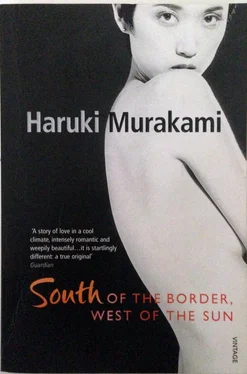As time passed, Shimamoto began to talk bit by bit about her junior high school and high school days. There being no direct connection between those days and her present life, she didn’t mind talking about them. I discovered how terribly lonely she had been. As she grew up, she tried her very best to be fair to everyone around her, never to make excuses. “Start making excuses, and there’s no end to it,” she told me. “I can’t live that kind of life.” But things didn’t work out well. Her attitude only gave rise to stupid misunderstandings, which hurt her deeply. Steadily, she shut herself away. Waking up in the morning, she’d vomit and refuse to go to school.
She showed me a photograph taken when she entered high school. She was sitting on a chair in a garden, with sunflowers in bloom around her. It was summer, and she had on denim shorts and a white T-shirt She was gorgeous. Facing the camera, she was smiling broadly. Compared to her smile now, she looked a bit self-conscious. Even so, it was a wonderful smile. The kind of smile that, through its very precariousness, affected people all the more. Certainly not the smile of a lonely girl spending each day in misery.
“Judging by this picture,” I told her, “I’d say you were the happiest girl in the world.”
She shook her head slowly. Charming lines appeared at the corners of her eyes; she looked as if she were recalling some far-off scene from the past “Hajime, you can’t tell anything from photographs. They’re just a shadow. The real me is far away. That won’t show up in a picture.”
The photograph brought a pain to my chest. It made me realize what an awful amount of time I had lost. Precious years that could never be recovered, no matter how much I struggled to bring them back. Time that existed only then, only in that place. I gazed at the photo for the longest time.
“What’s so interesting about the picture?” she asked.
“I’m trying to fill in time,” I replied. “It’s been twenty-five years since I saw you last. I want to fill in that gap, even a little.”
She smiled and looked at me quizzically, as if there was something weird about my face. “It’s strange,” she said. “You want to fill in that blank space of time, but I want to keep it all blank.”
From junior high through high school, she never had a real boyfriend. She was a beautiful girl, so boys paid attention to her, but she barely noticed them. She went out with a few, but never for very long.
“Boys that age are hard to like. You understand. Teenage boys are uncouth and selfish. And all they can think about is getting their hand up a girl’s skirt. I was so disappointed. I wanted what the two of us used to have.”
“Yeah, but when I was sixteen I wasn’t any different—uncouth, selfish, and trying to get my hand up a girl’s skirt. That was me in a nutshell.”
“I guess it was better I didn’t meet you then,” she said, and smiled. “Saying goodbye at twelve, meeting again at thirty-seven … maybe this is the best way for us, after all.”
“I wonder.”
“Now you’re able to think of a few things other than what’s under a girl’s skirt, right?”
“A few,” I said. “But if that’s got you worried, maybe next time you’d better wear pants!”
Shimamoto gazed at her hands, resting on the table-top, and laughed. She didn’t wear a ring. A bracelet, and a new watch every time we met. And earrings. But never a ring.
“I didn’t want to be a burden to any boy,” she continued. “You know what I mean. There were so many things I couldn’t do. Going on picnics, swimming, skiing, skating, dancing at a disco. It was hard enough just to walk. All I could do was sit with someone, talk, and listen to music, which boys that age couldn’t stand for very long. And I hated that.”
She drank Perrier with a twist of lemon. It was a warm afternoon in the middle of March. Some of the young people passing by on the street outside were decked out in short-sleeved shirts.
“If I had gone out with you then, I know I would have ended up being a burden to you. You would soon have been fed up with me. You would have wanted to be more active, to take a running leap into the wide world outside. And I wouldn’t have been able to endure it.”
“Shimamoto-san,” I said, “that’s impossible. I never would have been impatient with you. We had something very special. I can’t explain it in words, but it’s true. A special, precious something.”
She looked at me closely, her expression unchanged.
“I’m not some great person,” I continued. “I’m not much to brag about. I used to be pretty crude, insensitive, and arrogant. So maybe I wouldn’t have been the right person for you. But there is one thing I am certain about: I never, ever would have been fed up with you. That, at least, makes me different from other people you knew. In that sense I am indeed a special person for you.”
Shimamoto’s gaze again shifted to her hands on the table. She lightly spread her fingers, as if checking all ten of them.
“Hajime,” she began, “the sad truth is that certain types of things can’t go backward. Once they start going forward, no matter what you do, they can’t go back the way they were. If even one little thing goes awry, then that’s how it will stay forever.”
Once, she called to invite me to a concert of Liszt piano concertos. The soloist was a famous South American pianist. I cleared my schedule and went with her to the conceit hall at Ueno Park. The performance was brilliant The soloist’s technique was outstanding, the music both delicate and deep, and the pianist’s heated emotions were there for all to feel. Still, even with my eyes closed, the music didn’t sweep me away. A thin curtain stood between myself and the pianist and no matter how much I might try, I couldn’t get to the other side. When I told Shimamoto this after the concert, she agreed.
“But what was wrong with the performance?” she asked. “I thought it was wonderful.”
“Don’t you remember?” I said. “The record we used to listen to, at the end of the second movement there was this tiny scratch you could hear. Putchi! Putchi! Somehow, without that scratch, I can’t get into the music!”
Shimamoto laughed. “I wouldn’t exactly call that art appreciation.”
“This has nothing to do with art. Let a bald vulture eat that up, for all I care. I don’t care what anybody says; I like that scratch!”
“Maybe you’re right,” she admitted. “But what’s this about a bald vulture? Regular vultures I know about—they eat corpses. But bald vultures?”
In the train on the way home, I explained the difference in great detail. The difference in where they are born, their call, their mating periods. “The bald vulture lives by devouring art. The regular vulture lives by devouring the corpses of unknown people. They’re completely different”
“You’re a strange one!” She laughed. And there in the train seat ever so slightly, she moved her shoulder to touch mine. The one and only time in the past two months our bodies touched.
March passed, and so did April. My younger daughter started going to nursery school. With the kids away from home, Yukiko began doing volunteer work in the community, helping out at a home for handicapped children. Most of the time it was my job to take the kids to school and pick them up again. Whenever I was busy, my wife took over. Watching the children grow, day by day, I could feel myself aging. All by themselves, regardless of any plans I might have for them, my children were getting bigger. I loved my daughters, of course. Watching them grow up made me happier than anything. Sometimes, though, seeing them grow bigger by the month made me feel oppressed. It was as if a tree were growing inside my body, laying down roots, spreading its branches, pushing down on my organs, my muscles, bones, and skin, forcing its way outward. It was so stifling at times that I couldn’t sleep.
Читать дальше












